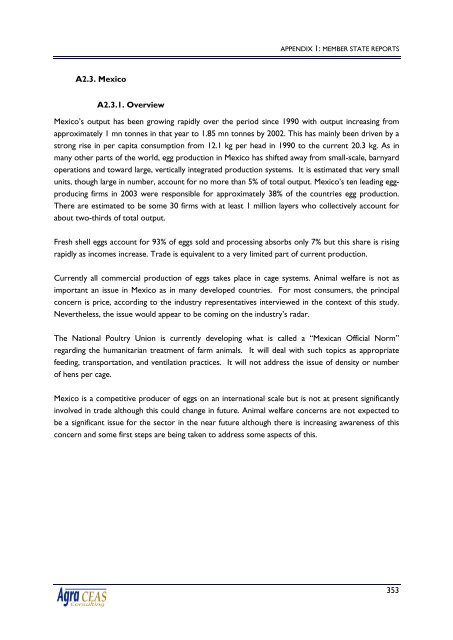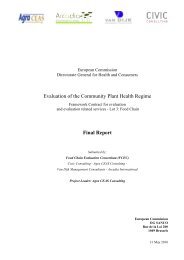- Page 1:
Study on thesocio-economic implicat
- Page 4 and 5:
THE SOCIO-ECONOMIC IMPLICATIONS OF
- Page 7 and 8:
THE SOCIO-ECONOMIC IMPLICATIONS OF
- Page 9:
THE SOCIO-ECONOMIC IMPLICATIONS OF
- Page 12 and 13:
THE SOCIO-ECONOMIC IMPLICATIONS OF
- Page 14 and 15:
THE SOCIO-ECONOMIC IMPLICATIONS OF
- Page 16 and 17:
THE SOCIO-ECONOMIC IMPLICATIONS OF
- Page 18 and 19:
THE SOCIO-ECONOMIC IMPLICATIONS OF
- Page 20 and 21:
THE SOCIO-ECONOMIC IMPLICATIONS OF
- Page 22 and 23:
THE SOCIO-ECONOMIC IMPLICATIONS OF
- Page 24 and 25:
THE SOCIO-ECONOMIC IMPLICATIONS OF
- Page 26 and 27:
THE SOCIO-ECONOMIC IMPLICATIONS OF
- Page 28 and 29:
THE SOCIO-ECONOMIC IMPLICATIONS OF
- Page 30 and 31:
THE SOCIO-ECONOMIC IMPLICATIONS OF
- Page 32 and 33:
THE SOCIO-ECONOMIC IMPLICATIONS OF
- Page 34 and 35:
THE SOCIO-ECONOMIC IMPLICATIONS OF
- Page 36 and 37:
THE SOCIO-ECONOMIC IMPLICATIONS OF
- Page 38 and 39:
THE SOCIO-ECONOMIC IMPLICATIONS OF
- Page 41 and 42:
THE SOCIO-ECONOMIC IMPLICATIONS OF
- Page 43 and 44:
THE SOCIO-ECONOMIC IMPLICATIONS OF
- Page 45 and 46:
THE SOCIO-ECONOMIC IMPLICATIONS OF
- Page 47 and 48:
THE SOCIO-ECONOMIC IMPLICATIONS OF
- Page 49 and 50:
THE SOCIO-ECONOMIC IMPLICATIONS OF
- Page 51 and 52:
THE SOCIO-ECONOMIC IMPLICATIONS OF
- Page 53 and 54:
THE SOCIO-ECONOMIC IMPLICATIONS OF
- Page 55 and 56:
THE SOCIO-ECONOMIC IMPLICATIONS OF
- Page 57 and 58:
THE SOCIO-ECONOMIC IMPLICATIONS OF
- Page 59 and 60:
THE SOCIO-ECONOMIC IMPLICATIONS OF
- Page 61 and 62:
THE SOCIO-ECONOMIC IMPLICATIONS OF
- Page 63 and 64:
THE SOCIO-ECONOMIC IMPLICATIONS OF
- Page 65 and 66:
THE SOCIO-ECONOMIC IMPLICATIONS OF
- Page 67 and 68:
THE SOCIO-ECONOMIC IMPLICATIONS OF
- Page 69 and 70:
THE SOCIO-ECONOMIC IMPLICATIONS OF
- Page 71 and 72:
THE SOCIO-ECONOMIC IMPLICATIONS OF
- Page 73:
THE SOCIO-ECONOMIC IMPLICATIONS OF
- Page 76 and 77:
THE SOCIO-ECONOMIC IMPLICATIONS OF
- Page 78 and 79:
THE SOCIO-ECONOMIC IMPLICATIONS OF
- Page 80 and 81:
THE SOCIO-ECONOMIC IMPLICATIONS OF
- Page 82 and 83:
THE SOCIO-ECONOMIC IMPLICATIONS OF
- Page 84 and 85:
THE SOCIO-ECONOMIC IMPLICATIONS OF
- Page 87 and 88:
THE SOCIO-ECONOMIC IMPLICATIONS OF
- Page 89:
THE SOCIO-ECONOMIC IMPLICATIONS OF
- Page 92 and 93:
THE SOCIO-ECONOMIC IMPLICATIONS OF
- Page 94 and 95:
THE SOCIO-ECONOMIC IMPLICATIONS OF
- Page 96 and 97:
THE SOCIO-ECONOMIC IMPLICATIONS OF
- Page 98 and 99:
THE SOCIO-ECONOMIC IMPLICATIONS OF
- Page 100 and 101:
THE SOCIO-ECONOMIC IMPLICATIONS OF
- Page 102 and 103:
THE SOCIO-ECONOMIC IMPLICATIONS OF
- Page 104 and 105:
THE SOCIO-ECONOMIC IMPLICATIONS OF
- Page 106 and 107:
THE SOCIO-ECONOMIC IMPLICATIONS OF
- Page 108 and 109:
THE SOCIO-ECONOMIC IMPLICATIONS OF
- Page 110 and 111:
THE SOCIO-ECONOMIC IMPLICATIONS OF
- Page 112 and 113:
THE SOCIO-ECONOMIC IMPLICATIONS OF
- Page 114 and 115:
THE SOCIO-ECONOMIC IMPLICATIONS OF
- Page 116 and 117:
THE SOCIO-ECONOMIC IMPLICATIONS OF
- Page 118 and 119:
THE SOCIO-ECONOMIC IMPLICATIONS OF
- Page 120 and 121:
THE SOCIO-ECONOMIC IMPLICATIONS OF
- Page 122 and 123:
THE SOCIO-ECONOMIC IMPLICATIONS OF
- Page 124 and 125:
THE SOCIO-ECONOMIC IMPLICATIONS OF
- Page 126 and 127:
THE SOCIO-ECONOMIC IMPLICATIONS OF
- Page 128 and 129:
THE SOCIO-ECONOMIC IMPLICATIONS OF
- Page 130 and 131:
THE SOCIO-ECONOMIC IMPLICATIONS OF
- Page 132 and 133:
THE SOCIO-ECONOMIC IMPLICATIONS OF
- Page 134 and 135:
THE SOCIO-ECONOMIC IMPLICATIONS OF
- Page 136 and 137:
THE SOCIO-ECONOMIC IMPLICATIONS OF
- Page 138 and 139:
THE SOCIO-ECONOMIC IMPLICATIONS OF
- Page 140 and 141:
THE SOCIO-ECONOMIC IMPLICATIONS OF
- Page 142 and 143:
THE SOCIO-ECONOMIC IMPLICATIONS OF
- Page 144 and 145:
THE SOCIO-ECONOMIC IMPLICATIONS OF
- Page 146 and 147:
THE SOCIO-ECONOMIC IMPLICATIONS OF
- Page 148 and 149:
THE SOCIO-ECONOMIC IMPLICATIONS OF
- Page 150 and 151:
THE SOCIO-ECONOMIC IMPLICATIONS OF
- Page 152 and 153:
THE SOCIO-ECONOMIC IMPLICATIONS OF
- Page 155 and 156:
THE SOCIO-ECONOMIC IMPLICATIONS OF
- Page 157 and 158:
THE SOCIO-ECONOMIC IMPLICATIONS OF
- Page 159 and 160:
THE SOCIO-ECONOMIC IMPLICATIONS OF
- Page 161 and 162:
THE SOCIO-ECONOMIC IMPLICATIONS OF
- Page 163 and 164:
THE SOCIO-ECONOMIC IMPLICATIONS OF
- Page 165 and 166:
THE SOCIO-ECONOMIC IMPLICATIONS OF
- Page 167 and 168:
THE SOCIO-ECONOMIC IMPLICATIONS OF
- Page 169 and 170:
THE SOCIO-ECONOMIC IMPLICATIONS OF
- Page 171 and 172:
THE SOCIO-ECONOMIC IMPLICATIONS OF
- Page 173 and 174:
THE SOCIO-ECONOMIC IMPLICATIONS OF
- Page 175 and 176:
THE SOCIO-ECONOMIC IMPLICATIONS OF
- Page 177 and 178:
THE SOCIO-ECONOMIC IMPLICATIONS OF
- Page 179 and 180:
THE SOCIO-ECONOMIC IMPLICATIONS OF
- Page 181 and 182:
THE SOCIO-ECONOMIC IMPLICATIONS OF
- Page 183 and 184:
THE SOCIO-ECONOMIC IMPLICATIONS OF
- Page 185 and 186:
THE SOCIO-ECONOMIC IMPLICATIONS OF
- Page 187 and 188:
THE SOCIO-ECONOMIC IMPLICATIONS OF
- Page 189 and 190:
THE SOCIO-ECONOMIC IMPLICATIONS OF
- Page 191 and 192:
THE SOCIO-ECONOMIC IMPLICATIONS OF
- Page 193 and 194:
THE SOCIO-ECONOMIC IMPLICATIONS OF
- Page 195 and 196:
THE SOCIO-ECONOMIC IMPLICATIONS OF
- Page 197 and 198:
THE SOCIO-ECONOMIC IMPLICATIONS OF
- Page 199 and 200:
THE SOCIO-ECONOMIC IMPLICATIONS OF
- Page 201 and 202:
APPENDIX 1: MEMBER STATE REPORTSA1.
- Page 203 and 204:
APPENDIX 1: MEMBER STATE REPORTSwhi
- Page 205 and 206:
APPENDIX 1: MEMBER STATE REPORTS3.0
- Page 207 and 208:
APPENDIX 1: MEMBER STATE REPORTSA1.
- Page 209 and 210:
APPENDIX 1: MEMBER STATE REPORTSTab
- Page 211 and 212:
APPENDIX 1: MEMBER STATE REPORTS765
- Page 213 and 214:
APPENDIX 1: MEMBER STATE REPORTS80%
- Page 215 and 216:
APPENDIX 1: MEMBER STATE REPORTSA1.
- Page 217 and 218:
APPENDIX 1: MEMBER STATE REPORTSwhe
- Page 219 and 220:
APPENDIX 1: MEMBER STATE REPORTSThe
- Page 221 and 222:
APPENDIX 1: MEMBER STATE REPORTS100
- Page 223 and 224:
APPENDIX 1: MEMBER STATE REPORTSTab
- Page 225 and 226:
APPENDIX 1: MEMBER STATE REPORTSA1.
- Page 227 and 228:
APPENDIX 1: MEMBER STATE REPORTS60%
- Page 229 and 230:
APPENDIX 1: MEMBER STATE REPORTSA1.
- Page 231 and 232:
APPENDIX 1: MEMBER STATE REPORTSTab
- Page 233 and 234:
APPENDIX 1: MEMBER STATE REPORTSAll
- Page 235 and 236:
APPENDIX 1: MEMBER STATE REPORTS60,
- Page 237 and 238:
APPENDIX 1: MEMBER STATE REPORTSTab
- Page 239 and 240:
APPENDIX 1: MEMBER STATE REPORTSA1.
- Page 241:
APPENDIX 1: MEMBER STATE REPORTSA1.
- Page 244 and 245:
APPENDIX 1: MEMBER STATE REPORTS121
- Page 246 and 247:
APPENDIX 1: MEMBER STATE REPORTS100
- Page 248 and 249:
APPENDIX 1: MEMBER STATE REPORTSTab
- Page 250 and 251:
APPENDIX 1: MEMBER STATE REPORTS454
- Page 252 and 253:
APPENDIX 1: MEMBER STATE REPORTS900
- Page 254 and 255:
APPENDIX 1: MEMBER STATE REPORTSTab
- Page 256 and 257:
APPENDIX 1: MEMBER STATE REPORTSTab
- Page 258 and 259:
APPENDIX 1: MEMBER STATE REPORTSTab
- Page 260 and 261:
APPENDIX 1: MEMBER STATE REPORTSThe
- Page 262 and 263:
APPENDIX 1: MEMBER STATE REPORTSThe
- Page 264 and 265:
APPENDIX 1: MEMBER STATE REPORTSA1.
- Page 266 and 267:
APPENDIX 1: MEMBER STATE REPORTSA1.
- Page 268 and 269:
APPENDIX 1: MEMBER STATE REPORTSsta
- Page 270 and 271:
APPENDIX 1: MEMBER STATE REPORTSTab
- Page 272 and 273:
APPENDIX 1: MEMBER STATE REPORTS100
- Page 274 and 275:
APPENDIX 1: MEMBER STATE REPORTSTab
- Page 276 and 277:
APPENDIX 1: MEMBER STATE REPORTSBox
- Page 278 and 279:
APPENDIX 1: MEMBER STATE REPORTSTab
- Page 281 and 282:
APPENDIX 1: MEMBER STATE REPORTSA1.
- Page 283 and 284:
APPENDIX 1: MEMBER STATE REPORTS100
- Page 285 and 286:
APPENDIX 1: MEMBER STATE REPORTSTab
- Page 287 and 288:
APPENDIX 1: MEMBER STATE REPORTSA1.
- Page 289 and 290:
APPENDIX 1: MEMBER STATE REPORTS160
- Page 291 and 292:
APPENDIX 1: MEMBER STATE REPORTSA1.
- Page 293 and 294:
APPENDIX 1: MEMBER STATE REPORTS100
- Page 295 and 296:
APPENDIX 1: MEMBER STATE REPORTSAt
- Page 297 and 298:
APPENDIX 1: MEMBER STATE REPORTSTab
- Page 299 and 300:
APPENDIX 1: MEMBER STATE REPORTSThe
- Page 301 and 302:
APPENDIX 1: MEMBER STATE REPORTSTab
- Page 303:
APPENDIX 1: MEMBER STATE REPORTSA1.
- Page 306 and 307:
APPENDIX 1: MEMBER STATE REPORTSAlt
- Page 308 and 309:
APPENDIX 1: MEMBER STATE REPORTSpro
- Page 310 and 311:
APPENDIX 1: MEMBER STATE REPORTSCag
- Page 312 and 313: APPENDIX 1: MEMBER STATE REPORTSTab
- Page 314 and 315: APPENDIX 1: MEMBER STATE REPORTSpro
- Page 316 and 317: APPENDIX 1: MEMBER STATE REPORTS160
- Page 318 and 319: APPENDIX 1: MEMBER STATE REPORTSwel
- Page 321 and 322: APPENDIX 1: MEMBER STATE REPORTSA1.
- Page 323 and 324: APPENDIX 1: MEMBER STATE REPORTS100
- Page 325 and 326: APPENDIX 1: MEMBER STATE REPORTSpro
- Page 327 and 328: APPENDIX 1: MEMBER STATE REPORTS St
- Page 329 and 330: APPENDIX 1: MEMBER STATE REPORTSThe
- Page 331 and 332: APPENDIX 1: MEMBER STATE REPORTSupw
- Page 333 and 334: APPENDIX 1: MEMBER STATE REPORTSTab
- Page 335 and 336: APPENDIX 1: MEMBER STATE REPORTSsup
- Page 337 and 338: APPENDIX 1: MEMBER STATE REPORTS4,5
- Page 339 and 340: APPENDIX 1: MEMBER STATE REPORTSWhi
- Page 341 and 342: APPENDIX 1: MEMBER STATE REPORTSApp
- Page 343 and 344: APPENDIX 1: MEMBER STATE REPORTSBot
- Page 345 and 346: APPENDIX 1: MEMBER STATE REPORTSTab
- Page 347 and 348: APPENDIX 1: MEMBER STATE REPORTS500
- Page 349 and 350: APPENDIX 1: MEMBER STATE REPORTSAnn
- Page 351 and 352: APPENDIX 1: MEMBER STATE REPORTSYEA
- Page 353 and 354: APPENDIX 1: MEMBER STATE REPORTSYEA
- Page 355 and 356: APPENDIX 1: MEMBER STATE REPORTSYEA
- Page 357 and 358: APPENDIX 1: MEMBER STATE REPORTSA2.
- Page 359 and 360: APPENDIX 1: MEMBER STATE REPORTSTab
- Page 361: APPENDIX 1: MEMBER STATE REPORTSA2.
- Page 365 and 366: APPENDIX 1: MEMBER STATE REPORTSMex
- Page 367 and 368: APPENDIX 1: MEMBER STATE REPORTSA2.
- Page 369 and 370: APPENDIX 1: MEMBER STATE REPORTSThe
- Page 371: APPENDIX 1: MEMBER STATE REPORTSTab
- Page 374 and 375: APPENDIX 2: THIRD COUNTRIESLooking
- Page 376 and 377: APPENDIX 2: THIRD COUNTRIES35302520
- Page 378 and 379: APPENDIX 2: THIRD COUNTRIES100%90%8
- Page 380 and 381: APPENDIX 2: THIRD COUNTRIES80000700
- Page 382 and 383: APPENDIX 2: THIRD COUNTRIESremainin
- Page 384 and 385: APPENDIX 2: THIRD COUNTRIESIt is an
- Page 386 and 387: APPENDIX 2: THIRD COUNTRIESThe deci
- Page 388 and 389: APPENDIX 2: THIRD COUNTRIESTable A2
- Page 390 and 391: APPENDIX 2: THIRD COUNTRIESTable A2
- Page 392 and 393: APPENDIX 2: THIRD COUNTRIESThe Iowa
- Page 394 and 395: APPENDIX 2: THIRD COUNTRIES4.54.544
- Page 396 and 397: APPENDIX 2: THIRD COUNTRIESIn slowi
- Page 398 and 399: APPENDIX 2: THIRD COUNTRIESprocesso
- Page 401 and 402: APPENDIX 2: THIRD COUNTRIESA2.5. Uk
- Page 403 and 404: APPENDIX 2: THIRD COUNTRIES5%6%34%9
- Page 405 and 406: APPENDIX 2: THIRD COUNTRIESTable A2
- Page 407 and 408: APPENDIX 2: THIRD COUNTRIESTable A2
- Page 409 and 410: APPENDIX 2: THIRD COUNTRIESAppendix
- Page 411 and 412: APPENDIX 2: THIRD COUNTRIESpaper ar
- Page 413 and 414:
APPENDIX 2: THIRD COUNTRIESfrom dom
- Page 415 and 416:
APPENDIX 2: THIRD COUNTRIESEndogeno
- Page 417 and 418:
APPENDIX 2: THIRD COUNTRIESSo X is
- Page 419 and 420:
APPENDIX 2: THIRD COUNTRIEShave emp
- Page 421 and 422:
APPENDIX 2: THIRD COUNTRIESreported
- Page 423 and 424:
APPENDIX 2: THIRD COUNTRIESA3.4.1.
- Page 425 and 426:
APPENDIX 2: THIRD COUNTRIESA3.5. Re
- Page 427 and 428:
APPENDIX 2: THIRD COUNTRIESSalhofer
- Page 429:
APPENDIX 2: THIRD COUNTRIESTable A3













